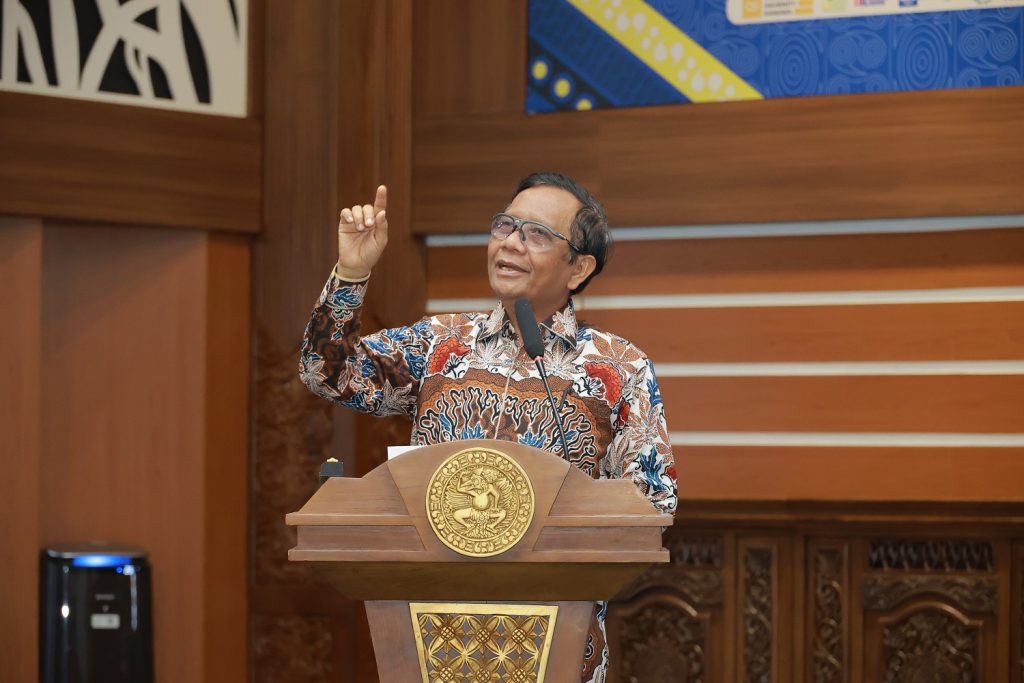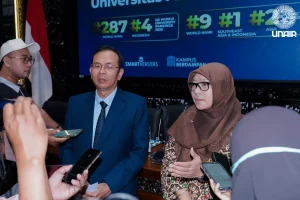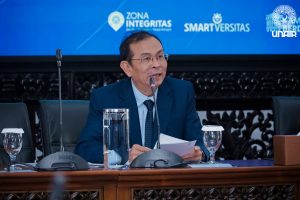UNAIR NEWS – Ahead of the 2024 General Election, candidates for government office often hold various campaign models. These parties use campuses to attract votes, especially the millennial generation. However, is it true that campuses can be a means of attracting the masses for elections? Coordinating Minister for Politics, Law and Security ( Menko Polhukam ) Prof Dr H Mohammad Mahfud MD SH SU MIP emphasized that it is inappropriate to conduct political campaigns in campuses. However, this does not mean that campuses cannot be a medium for political education.
He said Campuses could be a place for dialectical discussions on national political issues. He conveyed this in a guest lecture entitled Peluang dan Tantangan Demokrasi yang Bermartabat Menuju Indonesia Emas 2045 (Opportunities and the Challenges of Dignified Democracy towards a Golden Indonesia 2045). The guest lecture took place on Monday (16/10/2023) at the Garuda Mukti Hall, Management Office, MERR-C Campus, Universitas Airlangga (UNAIR).
“There should be no campaigns, lectures on electoral politics or practical politics. No political alignments. So, national politics are good national and state values, including teaching democracy, the constitution, etc.,” explained Prof. Mahfud.
National ideology and politics
According to Prof Mahfud, students need to understand national politics. For this reason, he delivered some political education to students through guest lecture.
In his presentation, Prof Mahfud said that politics has an extensive scope, including ideology. Since independence, Indonesia has established its ideology, Pancasila, which is a prismatic ideology. “Pancasila is scientifically called a prismatic ideology,” said Prof Mahfud.
Also read: Rector warns students about money politics in Menkopolhukam guest lecture
Prismatic ideology places Pancasila as the centrist. Pancasila stands in between extreme ideologies, such as secularism and a religious state.
“This prismatic ideology is the centrist ideology of all opposing extreme ideologies, such as the ideology of a secular state and a religious state,” he said.
Emphasize unity
Furthermore, Prof Mahfud said establishing Pancasila as the state ideology took a long time. Tough debates and discussions also became obstacles in determining this ideology.
However, the awareness of unity and oneness made the independence figures agree. They agreed that Pancasila was the right ideology for a pluralistic Indonesia.
“This ideology is decided through a debate full of rhetoric until finally, through a voting system, the ideology and shape of our country is determined. A unitary state with a republic form,” said Prof Mahfud.
Prof Mahfud emphasized that Pancasila has been the state ideology for a long time. Thus, the consequence is that Indonesia adheres to the principles of unity in diversity. This also includes the principles of democracy, which provide opportunities and freedom for the people to participate in government administration.
“In principle, we are building a country with the principles of unity, pluralism, tolerance, democracy, nomocracy and non-violence,” he stressed. (*)
Author: Yulia Rohmawati
Editor: Binti Q. Masruroh









